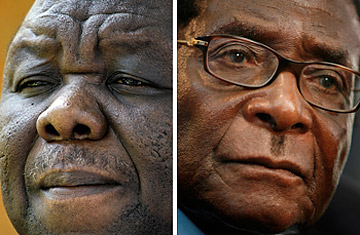
Zimbabwean opposition Movement for Democratic Change leader and Prime Minister-designate Morgan Tsvangirai and Zimbabwe's President Robert Mugabe
Any immediate hope of a resolution to Zimbabwe's political crisis ended late Friday, as opposition leader Morgan Tsvangirai announced that power-sharing negotiations with President Robert Mugabe's regime had failed. This week's crisis talks had been mediated by former South African President Thabo Mbeki on behalf of Zimbabwe's African neighbors, and Tsvangirai appealed to those neighbors to revive the search for a political compromise. "Regretably, after four days of intense negotiations, we have failed to agree ... [and] therefore a deadlock has been declared," said the leader of the Movement for Democratic Change (MDC) outside the talks venue in Harare. "There is an attempt to reduce the MDC to a meaningless position," he added, referring to the fact that Mugabe had claimed the key cabinet posts for his own party, and said this was "not acceptable to the MDC and the people of Zimbabwe." As far as Tsvangirai was concerned, that put the ball back in the hands of the African mediators: "We call upon the S.A.D.C. [the Southern African Development Community, who had mandated Mbeki to mediate] and the African Union, as guarantors to the political settlement, to use their collective wisdom to assist Zimbabwe in crafting a sustainable way forward for our country."
Before speeding away from the venue in his motorcade, Mugabe told journalists outside then venue,"It went well — in the wrong direction." He promised a full statement later.
The breakdown of the crisis talks poses a dilemma for Southern African governments which had hoped to see a power-sharing compromise to resolve the political crisis that has roiled Zimbabwe since A March 29 election in which Tsvangirai won a greater share of the vote than Mugabe.Resolving the power struggle is an essential precondition for restoring the international aid and investment necessary to rescue an economy in free fall, with unemployment at 80% and inflation out of control. Although Mbeki had managed to persuade the two leaders to share power in a Sept. 15 deal, once the discussion moved on to allocating ministries in a unity government — and taking some of the key levers of power out of the hands of Mugabe's Zanu-PF party — the process broke down. Mbeki flew back to Harare last week, hoping to save the deal, although his own authority had been reduced somewhat by the fact that he had, in the interim, been forced out of the presidency of his own country in a humiliating defeat.
Mugabe, under pressure from party cronies to hold the key cabinet positions for Zanu-PF, may also be betting that with more immediate concerns distracting the international community, he can push back against the power sharing without suffering too much pressure from his neighbors. Zimbabwe's only president since independence in 1980, Mugabe has taken wildly different positions since the March elections, in which the MDC won control of parliament and Tsvangirai finished first in the presidential race, although without an absolute majority. At the time, Mugabe said Zimbabweans had made a "mistake," and his security forces unleashed a wave of repression that left close to 200 M.D.C. supporters dead. The violence prompted Tsvangirai to withdraw from a second round of presidential elections, which Mugabe won — only to announce on his inauguration that he wanted to share power with the MDC. He then appeared to back-track on that promise before the September deal. Now, he appears to be once again stalling on sharing power.
The politicking continues against a backdrop of economic devastation — millions of Zimbabweans have fled the country in search of a livelihood, and aid agencies are warning of a severe food shortage, even starvation, over Christmas. Responding to those concerns, Tsvangirai said Friday: "We are mindful of the suffering of the people of Zimbabwe and the collapse of the economy as a result of decades of dictatorship, corruption and mismanagement. However, we are conscious that the people of Zimbabwe will not accept window-dressing and an empty politcal settlement that will not guarantee food, jobs, medicines, freedom and prosperity." But Mugabe appears to have other ideas about what the people of Zimbabwe, and their neighbors, will be prepared to accept.
(Click here for photographs of political tension in Zimbabwe.)
